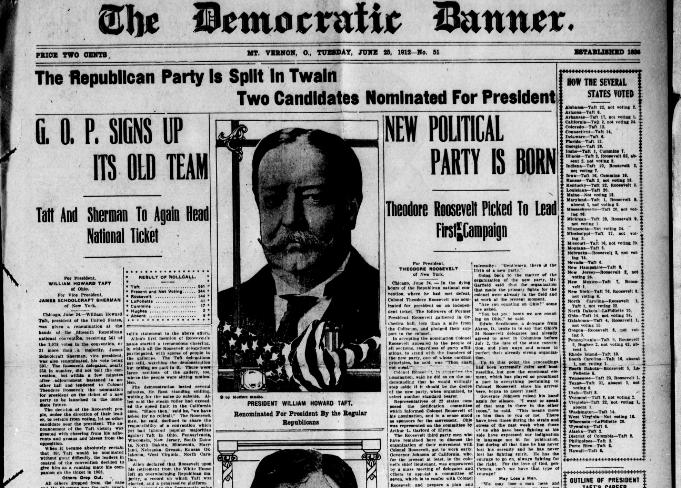|
Moderated by NW Okie! |
Volume 14 , Issue 262012Weekly eZine: (374 subscribers)Subscribe | Unsubscribe Using Desktop... |
100 Years Ago Today - 25 June 1912

Last week's OkieLegacy Ezine mentioned a new political party was born, The Bullmoose party, and Theodore Roosevelt was picked to lead the first campaign. This week one hundred years ago today, the headlines in The Democratic Banner, dated 25 June 1912, Tuesday, stated, "The Republican Party Is Split In Twain - Two Candidates Nominated For President."
The regular republicans of the GOP signed up its old team of President Taft and Sherman to again head the national ticket. But the article next to that feature was boasting a "New Party Is Born." And Theodore Roosevelt was picked to lead the first campaign.
On 24 June 1912, in Chicago, in the dying hours of the republican national convention, where Col. Theodore Roosevelt met defeat, he was nominated for president on an independent ticket. The followers of former president Roosevelt gathered in orchestra hall, less than a mile from the Coliseum, and pledged their support to the colonel.
As Col. Roosevelt accepted the nomination, he appealed to the people of all sections, regardless of party affiliations, to stand with the founders of the new party, one of whose cardinal principles was "Thou shalt not steal."
Col. Roosevelt, in accepting the nomination, said he did so on the understanding that he would willingly step aside if it should be the desire of the new party, when organized, to elect another standard bearer.
Representatives of 22 states composed the notification committee which informed Col. Roosevelt of his nomination, and in a sense stood as sponsors for the movement. Ohio was represented on the committee by Arthur L. Garford of Elyria.
The Roosevelt 3rd party men remained to discuss the organization of their movement with Col. Roosevelt, getting to work early. Governor Johnson of California, was the Colonel's chief lieutenant, empowered by a mass meeting of delegates and others to appoint a committee of seven, which was to confer with Col. Roosevelt and prepare a plan and platform tone presented tot he blotters' convention. No definite announcement of a plan was made, and the date of the convention was still to be decided. It was rumored that it might be held in Chicago on August 3rd (1912) and also that an attempt might be made to call the Roosevelt progressives together at Asbury Park.
The Roosevelt delegates to the number of 200 or 300 and Roosevelt shouters met in the Florentine room of the Congress hotel to inaugurate the formal temporary organization oft eh new party. Governor Johnson presided at the temporary meeting. AT his side were Medill McCormick, James R. Garfield and Senator Clapp of Minnesota. Governor Stubbs of Kansas came in but went out again before the meeting got down to business. Cecil Lyon of Texas had a front seat.
Governor Hiram Johnson announced that the progressives were "to begin on the road that is to lead to political freedom." Johnson said that in the committee to be formed, no attempt would be made at this time to represent each state, but that the time for action had arrived and that they must get down to work.
James R. Garfield got up and told the mass meeting that the laws of the different states were at variance so far as the selection of electors was concerned and that while in some states it would be easy to proceed with their campaign, it might be very difficult in others.
They laid the foundation with care and outlined definitely their plans to give Governor Johnson the power to select seven men, who, after a conference with Dol. Roosevelt, would be able to present tot he convention a plan of action that would make it possible to carry out this great movement of 1915. It became a birth of a new party.
It was some one jumping up in the back of the room to propose that the new party be named the "National progressive" party. Mr. Garfield announced that it was not yet time to consider the details of a name and that and other details must be left to the convention.
Towards the end of their meeting, steamrollered delegate Houck of Tennessee, jumped up and said he had not talked before for a week and it was quite apparent that he was boiling over with suppressed indignation. He made a fire-eating speech of the thief and fraud order and declared that Tennessee would go solid for Theodore Roosevelt. While Houck was talking, Gifford Pinchot, came in wearing a brilliant red bandana handkerchief tied about his left arm. A man jumped upon a table with a huge armful of red and blue bandanas and said, "The new Roosevelt and progressive badge," he shouted. "Remember it is the handkerchief of the plain people."
| View or Add Comments (0 Comments)
| Receive
updates ( subscribers) |
Unsubscribe
| © . Linda Mcgill Wagner - began © 1999 Contact Me | |
